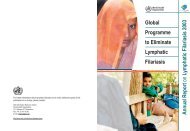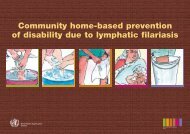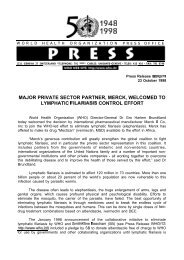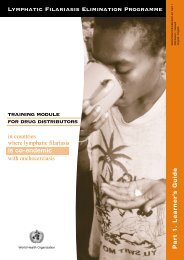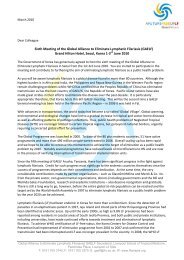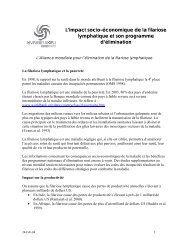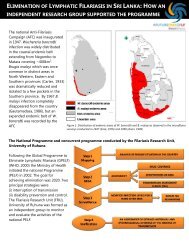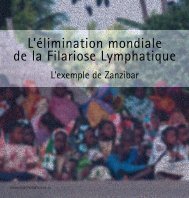English - Global Alliance to Eliminate Lymphatic Filariasis
English - Global Alliance to Eliminate Lymphatic Filariasis
English - Global Alliance to Eliminate Lymphatic Filariasis
Create successful ePaper yourself
Turn your PDF publications into a flip-book with our unique Google optimized e-Paper software.
REPORT OF THE 6 TH GAELF MEETING, JUNE 2010<br />
and highlight our successes for the<br />
purposes of advocacy.<br />
Alternative strategies for LF elimination<br />
should be explored, while vigorously<br />
pursuing the current strategy. The<br />
application of alternative strategies raises<br />
many questions, including the possible<br />
role of antibiotics, and how they might be<br />
used in specific populations. Vec<strong>to</strong>r<br />
control should be enhanced, but where,<br />
how, and by whom?<br />
Discussion<br />
An animated discussion followed<br />
Professor Molyneux’s presentation. Dr<br />
Richards agreed that the NTD “brand” is<br />
useful for advocacy, but pointed out that<br />
disease elimination has also been<br />
successful at attracting donors. He argued<br />
that we should not forget the goal of LF<br />
elimination, even within the context of<br />
NTDs. Dr Gyapong stated that use of<br />
antibiotics for LF elimination is a worthy<br />
<strong>to</strong>pic for research, but premature as<br />
policy. Dr John Ehrenberg, from WPR,<br />
made the case for prioritizing a final push<br />
for LF elimination in the Pacific.<br />
Dr Jacobson suggested three innovations<br />
for next 10 years. First, a “buddy” or<br />
partnership programme could be<br />
developed between countries just<br />
beginning LF elimination programmes and<br />
those with experience – especially south<strong>to</strong>-south<br />
linkages. Second, more rapid<br />
streamlining of research results in<strong>to</strong> the<br />
field could be facilitated by programme<br />
advisors, who could work with country<br />
programme managers <strong>to</strong> keep them<br />
abreast of latest research developments<br />
and provide consultation on<br />
implementation. Finally, she suggested an<br />
“LF elimination think-tank” <strong>to</strong> consider<br />
deeply and in detail what is needed <strong>to</strong><br />
achieve the 2020 goal.<br />
Conclusions and Reflections<br />
Dr Mwele Malecela introduced the new<br />
Chair of the GAELF Representative Contact<br />
Group (RCG), Maged El-Se<strong>to</strong>uhy, Professor<br />
of Public Health and Epidemiology at Ain<br />
Shams University, in Cairo. She also<br />
announced the results of the election for<br />
the Executive Group (see page 32).<br />
Dr Malecela reflected on her 4-year term<br />
as Chair of the RCG. During this time, the<br />
RCG has worked <strong>to</strong> establish regional<br />
platforms that focus on regional issues<br />
and priorities in LF elimination. She<br />
emphasized that the regionalization<br />
process will continue with integrated NTD<br />
control programmes. She also noted that,<br />
with the growth of the GAELF, there has<br />
been some discussion about its future<br />
structure, and that this issue has been<br />
referred <strong>to</strong> the next GAELF meeting.<br />
Dr Malecela reviewed the major<br />
developments in LF elimination over the<br />
past four years, concluding that “the<br />
strategy does work – the glass is half-full.”<br />
Operational research has been critical in<br />
addressing challenges, and this will<br />
continue. She encouraged GAELF<br />
members <strong>to</strong> embrace integration with<br />
NTDs and <strong>to</strong> serve as leaders within the<br />
new initiative. Of the many challenges<br />
that were discussed during the GAELF6,<br />
upscaling MDA is “the big one.”<br />
Concentrated efforts need <strong>to</strong> be made in<br />
morbidity management, with the help of<br />
new partnerships.<br />
Closing Ceremony<br />
Dr Engels noted the progress made during<br />
the first 10 years of the GAELF, and agreed<br />
that the glass is half full. But, he noted,<br />
there is no room for complacency. Major<br />
challenges lie ahead, and strategies have<br />
been put in place <strong>to</strong> face the challenges<br />
that will arise.<br />
47



